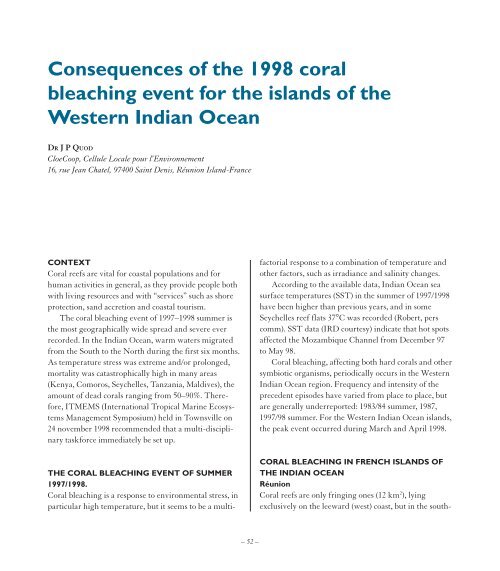Create successful ePaper yourself
Turn your PDF publications into a flip-book with our unique Google optimized e-Paper software.
Consequences of the 1998 coral<br />
bleaching event for the islands of the<br />
Western Indian Ocean<br />
DR J P QUOD<br />
CloeCoop, Cellule Locale pour l’Environnement<br />
16, rue Jean Chatel, 97400 Saint Denis, Réunion Island-France<br />
CONTEXT<br />
Coral reefs are vital for coastal populations and for<br />
human activities in general, as they provide people both<br />
with living resources and with “services’’ such as shore<br />
protection, sand accretion and coastal tourism.<br />
The coral bleaching event of 1997–1998 summer is<br />
the most geographically wide spread and severe ever<br />
recorded. In the Indian Ocean, warm waters migrated<br />
from the South to the North during the first six months.<br />
As temperature stress was extreme and/or prolonged,<br />
mortality was catastrophically high in many areas<br />
(Kenya, Comoros, Seychelles, Tanzania, Maldives), the<br />
amount of dead corals ranging from 50–90%. Therefore,<br />
ITMEMS (International Tropical Marine Ecosystems<br />
Management Symposium) held in Townsville on<br />
24 november 1998 recommended that a multi-disciplinary<br />
taskforce immediately be set up.<br />
THE CORAL BLEACHING EVENT OF SUMMER<br />
1997/1998.<br />
Coral bleaching is a response to environmental stress, in<br />
particular high temperature, but it seems to be a multifactorial<br />
response to a combination of temperature and<br />
other factors, such as irradiance and salinity changes.<br />
According to the available data, Indian Ocean sea<br />
surface temperatures (SST) in the summer of 1997/1998<br />
have been higher than previous years, and in some<br />
Seychelles reef flats 37°C was recorded (Robert, pers<br />
comm). SST data (IRD courtesy) indicate that hot spots<br />
affected the Mozambique Channel from December 97<br />
to May 98.<br />
Coral bleaching, affecting both hard corals and other<br />
symbiotic organisms, periodically occurs in the Western<br />
Indian Ocean region. Frequency and intensity of the<br />
precedent episodes have varied from place to place, but<br />
are generally underreported: 1983/84 summer, 1987,<br />
1997/98 summer. For the Western Indian Ocean islands,<br />
the peak event occurred during March and April 1998.<br />
CORAL BLEACHING IN FRENCH ISLANDS OF<br />
THE INDIAN OCEAN<br />
Réunion<br />
Coral reefs are only fringing ones (12 km 2 ), lying<br />
exclusively on the leeward (west) coast, but in the south-<br />
– 52 –


















